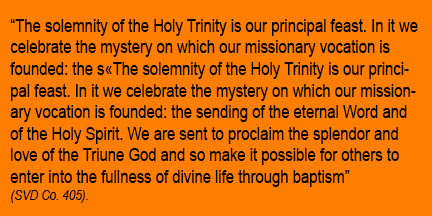Every day, Christians all around the world proclaim that God is Father, Son and Holy Spirit. Every time we make the sign of the cross we are blessing ourselves or blessing others in the name of the Holy Trinity.
There are even Catholics who think that the Holy Trinity is just another blessed woman like Santa Maria, Santa Isabel or Santa Clara. For many priests, Holy Trinity immediately evokes this particular Sunday of the year in which it is extremely difficult to give a homily.
Indeed, how can we explain that 1+1 and +1 equals 1? How to understand that our God is one in three persons? Or how to explain to an average Sunday congregation, as the scholastic theologians tried to do, that in God there are five notions, 4 relations, 3 persons, 2 processions, and one nature? It is said that when the well known theologian Bernard Lonergan explained this statement of scholastic theology to his students, he used to add: "and 'zero understanding". So, unable to compete with those outstanding theologians, I just want to share with you two ideas that came to my mind as I read today’s readings.
The first idea is about God’s mission. The decree Ad gentes says that the Church is missionary by its very nature since it is from the mission of the Son and the mission of the Spirit that she draws her origin in accordance with the decree of God the Father. In the gospel that we read today (Jn 3:16-18), Jesus explains to Nicodemus what is that decree or will of the Father: "God did not send his Son into the world to condemn the world, but that the world might be saved through him". This is God’s plan of salvation for everyone, and to make it possible, he gave us his only Son. Empowered by the Spirit, we are called to commit our lives to God’s mission that none of his children be forgotten, and that everyone might share His life.
The second idea is about love. A Portuguese poet once wrote: "I am amazed when someone, by chance and almost always without reason, tells me he does not know what love is. I know exactly what love is. Love is knowing that there is a part of us that no longer belongs to us. Love is knowing that we forgive everything to that part of us that is not ours. Love is to be weak, being afraid and wanting to die". To love each one of us, and to love every human being, God became man, became weak, in the Gethsemane he was afraid, and he died on the cross. But, this weakness was his real strength.
In the first reading (Ex 34:4B-6, 8-9 ) we read that God reveals himself to Moses describing himself as «a merciful and gracious God, slow to anger and rich in kindness and fidelity». I believe that the more we grow in the understanding of God as a communion, as a community of love (Father, Son and Holy Spirit) the more we will enlarge our own heart to overcome egotism and to welcome every brother and sister. I believe that the more we grow in the understanding that the triune God is love, the more we will able to commit ourselves to spread God’s plan of salvation to everyone and to grow in mercy, kindness and forgiveness.
This morning I received an email from an SVD who is working in eastern Angola. He writes: "I'm back after a journey of many surprises and tiredness. I went with a catechist to a place where we do not have communities but we were there to see the chances to start one. The farthest village is 190 kms away. In two days, we only had one meal, we didn’t take a shower and we slept on the floor. All this because when the catechist was announcing the visit, no one believed him because they had not seen a priest in their place from the time of the war. However, it was worth every sacrifice, and we started a community. In one village we met an old man who had built a tent and, for more than two years prayed there alone, believing that one day the missionaries would come. His countrymen just derided him. Seeing the joy of this old man, our pain and tiredness disappeared. Now people believe that God has not abandoned them."
This is an example how the love of God can move us forward in mission. However, love always requires an attitude of self-denial and sacrifice. May we grow in our commitment to proclaim the good news of God especially among those who are at the margins, or have lost any kind hope.
José Antunes









